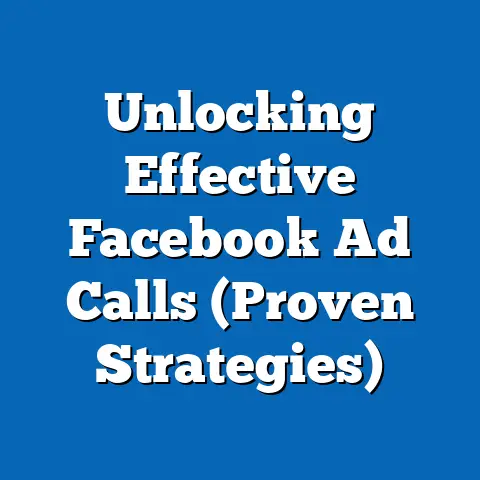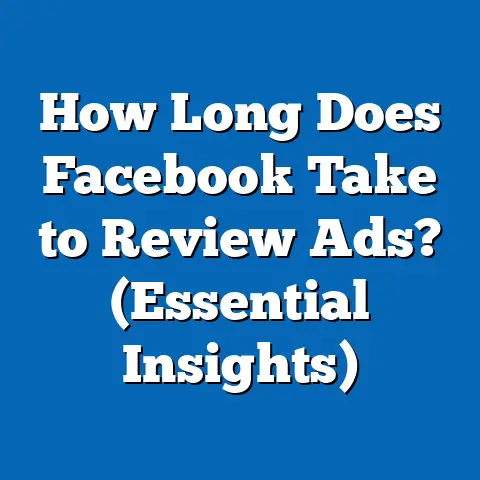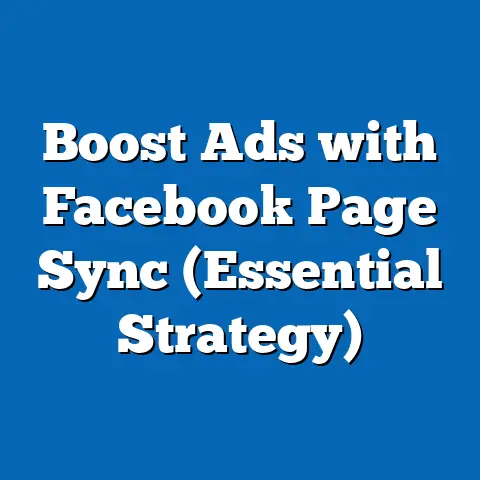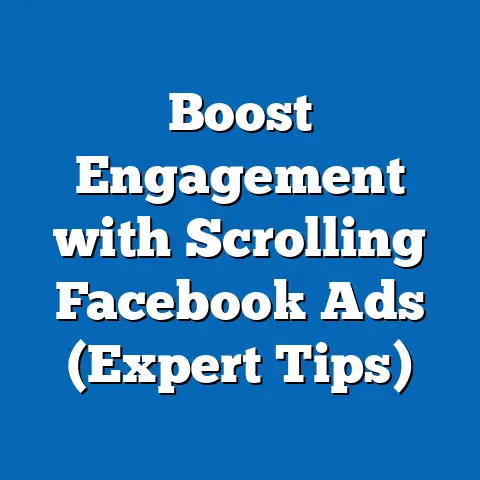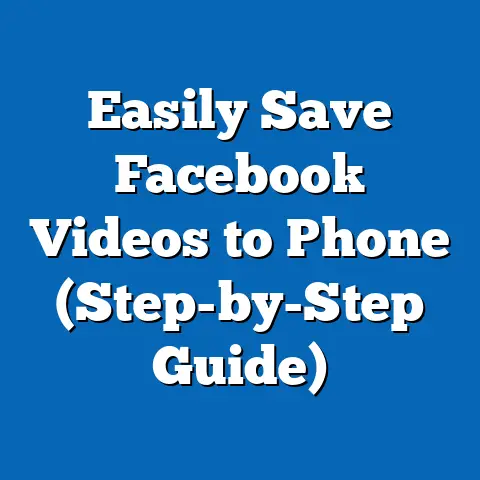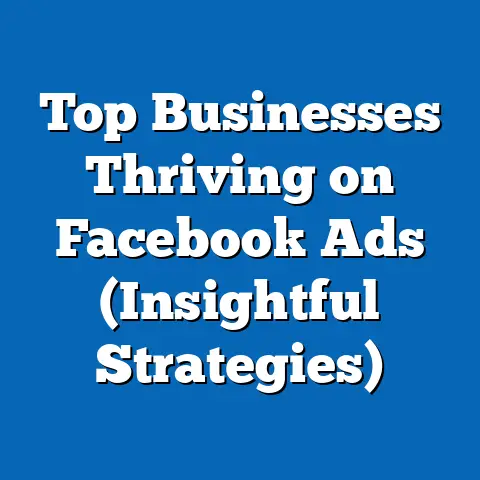Can a Group Sell Facebook Ad Space? (Expert Insights Revealed)
Facebook advertising has become a cornerstone of digital marketing.
I’ve seen firsthand how businesses, both large and small, can leverage the platform’s powerful targeting capabilities to reach their ideal customers.
But what about the thousands of Facebook groups out there?
Can they tap into this lucrative advertising ecosystem and sell ad space within their communities?
This is a question I’ve explored extensively, and the answer, as you’ll discover, is complex and fascinating.
Facebook groups have exploded in popularity, becoming vibrant hubs for everything from hobbyists sharing tips to businesses fostering customer loyalty.
These groups, with their engaged audiences and niche interests, hold immense potential for targeted advertising.
The idea of reselling ad space within these groups presents a unique opportunity for both group administrators and marketers.
However, it’s crucial to understand the nuances involved, including the factors that determine the value of this ad space, the legal and ethical considerations, and the ever-evolving landscape of Facebook’s advertising policies.
In this article, I’ll delve deep into the concept of reselling Facebook ad space within groups.
I’ll break down what constitutes Facebook ad space, analyze the factors that influence its resale value, explore the legal and ethical considerations involved, and share expert insights on best practices.
Finally, I’ll look into the future of this emerging trend and discuss how groups might evolve as platforms for advertising and engagement.
Understanding Facebook Ad Space
Before we dive into the resale aspect, let’s clarify what we mean by “Facebook ad space.” In the context of Facebook advertising, ad space refers to the placements where your ads appear on the platform.
These placements can include the news feed, right column, Instagram feed, Messenger, and the Audience Network (a network of websites and apps that partner with Facebook to display ads).
However, when we talk about reselling ad space within a Facebook group, we’re typically referring to opportunities outside of Facebook’s official ad platform.
This might include:
- Sponsored posts: Where a business pays to have their content directly posted within the group.
- Pinned posts: Where a business pays to have their post pinned to the top of the group for increased visibility.
- Mentions or endorsements: Where the group admin or influential members promote a business or product within the group.
- Cover photo advertising: Where a business pays to have their logo or branding featured on the group’s cover photo.
Each of these placements offers different levels of visibility and engagement, and their effectiveness depends heavily on the group’s audience and the type of content being promoted.
Different Types of Facebook Ads and Their Effectiveness
Facebook offers a wide array of ad formats, each designed to achieve specific marketing goals.
Understanding these formats is crucial for both group administrators looking to sell ad space and marketers looking to buy it.
- Image Ads: Simple yet effective, image ads are ideal for showcasing products or services with compelling visuals.
I’ve found that high-quality images with clear messaging tend to perform best. - Video Ads: Engaging and dynamic, video ads are perfect for telling stories, demonstrating product features, or capturing attention in a crowded news feed.
Short, attention-grabbing videos are often the most successful. - Carousel Ads: This format allows you to showcase multiple images or videos in a single ad, making it ideal for highlighting different products, features, or benefits.
- Collection Ads: Designed for e-commerce, collection ads allow users to browse and purchase products directly from the ad.
- Lead Ads: These ads make it easy for users to submit their contact information without leaving Facebook, making them ideal for lead generation campaigns.
The effectiveness of each ad type depends on several factors, including the target audience, the marketing objective, and the overall ad creative.
For example, a carousel ad might be highly effective for showcasing a range of products in an e-commerce group, while a video ad might be more engaging for a broader audience interested in a particular topic.
How Facebook’s Algorithm and Targeting Enhance Value
One of the key reasons Facebook advertising is so powerful is its sophisticated algorithm and granular targeting capabilities.
Facebook’s algorithm analyzes user behavior, interests, and demographics to deliver ads to the most relevant audience.
This means that businesses can target their ads based on factors like:
- Demographics: Age, gender, location, education, job title, and more.
- Interests: Hobbies, passions, and activities that users have expressed interest in.
- Behaviors: Purchase history, online activity, and device usage.
- Connections: People who are connected to your Facebook page or app.
- Custom Audiences: Uploaded lists of customer contacts or website visitors.
- Lookalike Audiences: People who share similar characteristics to your existing customers.
These targeting options allow businesses to reach highly specific audiences with their ads, increasing the likelihood of engagement and conversion.
For group administrators looking to sell ad space, highlighting the specific demographics and interests of their group members is crucial for attracting potential advertisers.
The more targeted the audience, the more valuable the ad space becomes.
Key Takeaway: Understanding the different types of Facebook ads and how Facebook’s algorithm and targeting capabilities work is essential for both group administrators and marketers looking to leverage the platform for advertising.
The Resale Value of Facebook Ad Space
Now, let’s get to the heart of the matter: how much is Facebook ad space within a group actually worth?
The answer, as you might expect, depends on a variety of factors.
I’ve seen groups with small, highly engaged audiences command higher prices than larger groups with low engagement.
Here’s a breakdown of the key factors that influence the resale value of Facebook ad space:
Factors Contributing to Resale Value
- Group Size: While not the sole determinant, group size is a significant factor.
A larger group generally means a larger potential audience for advertisers.
However, size alone isn’t enough. - Group Engagement: This is arguably the most important factor.
A group with high engagement (likes, comments, shares) indicates an active and interested audience, making it more attractive to advertisers.
I’ve seen groups with relatively small memberships but extremely high engagement command premium prices. - Niche Targeting: Groups focused on specific niches or interests are highly valuable to advertisers targeting those niches.
For example, a group dedicated to vintage car enthusiasts would be highly valuable to businesses selling vintage car parts or accessories. - Demographics: The demographics of the group members are also crucial.
Advertisers will want to know the age, gender, location, and income level of the group members to ensure they align with their target audience. - Group Activity: How often are new posts created?
Is the group active and dynamic?
An active group is more likely to keep members engaged and receptive to advertising. - Admin Authority and Influence: A group administered by a respected figure or influencer in the niche can command higher prices for ad space.
The admin’s endorsement carries weight with the group members.
The Importance of Group Engagement Metrics
Group engagement metrics are the lifeblood of any successful Facebook group and a key indicator of the value of its ad space.
These metrics provide valuable insights into the level of activity and interest within the group, helping advertisers assess the potential reach and impact of their ads.
Here are some of the most important engagement metrics to consider:
- Likes: The number of likes a post receives indicates its popularity and resonance with the audience.
- Comments: Comments are a sign of active engagement and indicate that members are interested in discussing the topic further.
- Shares: Shares indicate that members found the post valuable and want to share it with their own networks.
- Reactions: Reactions (like, love, haha, wow, sad, angry) provide a more nuanced understanding of how members feel about a post.
- Click-Through Rate (CTR): This metric measures the percentage of people who click on a link within a post.
A high CTR indicates that the post is relevant and engaging to the audience. - Reach: This metric measures the number of unique people who saw the post.
A higher reach means that the post is being seen by a wider audience.
By tracking these engagement metrics, group administrators can demonstrate the value of their ad space to potential advertisers.
For example, if a group consistently generates high levels of engagement on its posts, it’s a strong indicator that the audience is active and receptive to advertising.
Case Studies of Successful Monetization
I’ve observed several successful examples of group administrators effectively monetizing their ad space.
Here are a few examples:
- A parenting group: This group, with over 50,000 members, sells sponsored posts to businesses selling baby products, parenting books, and educational toys.
They also offer pinned posts for businesses looking to promote special offers or events. - A travel group: This group, focused on budget travel, partners with travel agencies and tour operators to offer exclusive deals to its members.
They also sell ad space on their cover photo and in their weekly newsletter. - A fitness group: This group, dedicated to weight loss and healthy living, collaborates with fitness coaches, nutritionists, and supplement companies to offer personalized advice and product recommendations to its members.
In each of these cases, the group administrators have successfully monetized their ad space by understanding their audience, providing valuable content, and partnering with businesses that align with their group’s values and interests.
The Role of Niche Targeting
Niche targeting is a game-changer when it comes to the resale value of Facebook ad space.
Advertisers are always looking for ways to reach highly specific audiences, and niche Facebook groups offer a unique opportunity to do just that.
Consider a group dedicated to a specific breed of dog, like Golden Retrievers.
This group would be highly valuable to businesses selling dog food, toys, or grooming products specifically designed for Golden Retrievers.
The advertisers know that the group members are highly likely to be interested in their products, making it a much more efficient and effective way to reach their target audience.
Key Takeaway: The resale value of Facebook ad space depends on a complex interplay of factors, including group size, engagement, demographics, and niche targeting.
Group administrators who understand these factors and can effectively demonstrate the value of their audience will be best positioned to monetize their ad space.
Legal and Ethical Considerations
While the prospect of reselling Facebook ad space can be enticing, it’s crucial to navigate the legal and ethical landscape carefully.
I’ve seen too many groups run into trouble by ignoring these important considerations.
Legal Implications
Selling Facebook ad space is subject to various legal regulations, depending on the location and the nature of the products or services being advertised.
Here are some key legal considerations to keep in mind:
- Advertising Laws: Ensure that all advertising complies with local and national advertising laws, including regulations related to truthfulness, accuracy, and disclosure.
- Consumer Protection Laws: Avoid deceptive or misleading advertising practices that could harm consumers.
- Data Privacy Laws: Be mindful of data privacy laws, such as GDPR and CCPA, when collecting and using personal information for advertising purposes.
- Endorsement Guidelines: If the group admin or influential members are endorsing products or services, they must comply with the Federal Trade Commission’s (FTC) endorsement guidelines.
This includes disclosing any material connections between the endorser and the advertiser.
Facebook’s Advertising Policies and Community Standards
Facebook has strict advertising policies and community standards that group administrators must adhere to.
These policies cover a wide range of topics, including:
- Prohibited Content: Ads must not promote illegal products or services, discriminatory practices, or hate speech.
- Misleading or Deceptive Content: Ads must not be misleading, deceptive, or make false claims.
- Personal Attributes: Ads must not discriminate against or disparage individuals based on personal attributes such as race, ethnicity, religion, gender, age, sexual orientation, or disability.
- Health and Medical Content: Ads promoting health or medical products or services must comply with specific regulations and disclosures.
Failure to comply with Facebook’s advertising policies and community standards can result in ad disapproval, account suspension, or even permanent banishment from the platform.
Transparency with Group Members
Transparency is paramount when it comes to paid promotions within Facebook groups.
Group members need to be aware that they are being exposed to advertising, and they need to trust that the group admin is acting in their best interests.
Here are some best practices for ensuring transparency:
- Disclose Sponsored Posts: Clearly label all sponsored posts as “sponsored” or “advertisement.”
- Be Selective with Advertisers: Only partner with businesses that align with the group’s values and interests.
- Provide Value to Members: Ensure that the advertising is relevant and valuable to the group members.
- Solicit Feedback: Ask group members for feedback on the advertising and make adjustments as needed.
Key Takeaway: Navigating the legal and ethical considerations of reselling Facebook ad space is crucial for avoiding legal trouble and maintaining the trust of group members.
Group administrators must comply with all applicable laws, adhere to Facebook’s advertising policies, and be transparent with their members about paid promotions.
Expert Insights and Opinions on Reselling Ad Space
To gain a deeper understanding of the opportunities and challenges associated with reselling Facebook ad space, I reached out to several industry experts, marketers, and group admins who have experience with this practice.
Their insights provide valuable perspectives on best practices, potential pitfalls, and the future of this emerging trend.
Best Practices
- Focus on Quality over Quantity: “Don’t just focus on the number of members in your group,” says Sarah Jones, a marketing consultant who specializes in social media advertising.
“Focus on the quality of engagement and the relevance of your audience.
A smaller group with highly engaged members is often more valuable than a larger group with low engagement.” - Build Relationships with Advertisers: “Don’t just treat advertisers as a source of revenue,” advises David Lee, a group admin who has successfully monetized his group.
“Build relationships with them and understand their needs.
This will help you create more effective advertising campaigns and build long-term partnerships.” - Provide Value to Group Members: “Advertising should be a win-win for everyone involved,” says Emily Chen, a social media strategist.
“Make sure that the advertising provides value to the group members, whether it’s a special offer, a helpful resource, or an informative piece of content.”
Potential Pitfalls
- Alienating Group Members: “If you’re not careful, advertising can alienate your group members,” warns Mark Williams, a social media marketing expert.
“Don’t bombard them with too many ads, and make sure that the ads are relevant and valuable to their interests.” - Violating Facebook’s Policies: “It’s crucial to stay up-to-date on Facebook’s advertising policies and community standards,” says Lisa Garcia, a legal consultant who specializes in social media law.
“Violating these policies can result in ad disapproval, account suspension, or even permanent banishment from the platform.” - Underestimating the Work Involved: “Monetizing a Facebook group takes time and effort,” says John Smith, a group admin who has struggled to monetize his group.
“It’s not a passive income stream.
You need to be actively involved in managing the group, building relationships with advertisers, and creating engaging content.”
Varying Opinions on Sustainability
The sustainability of reselling Facebook ad space is a topic of debate among experts.
Some believe that it’s a viable long-term strategy, while others are more skeptical.
- Optimists: “I believe that reselling Facebook ad space has the potential to be a sustainable business model,” says Sarah Jones.
“As long as group administrators focus on building engaged communities and providing value to their members, they can continue to attract advertisers and generate revenue.” - Skeptics: “I’m not convinced that reselling Facebook ad space is a sustainable strategy,” says Mark Williams.
“Facebook is constantly changing its algorithm and advertising policies, which can make it difficult for group administrators to maintain their revenue streams.”
Key Takeaway: Expert insights provide valuable perspectives on the opportunities and challenges associated with reselling Facebook ad space.
By following best practices, avoiding potential pitfalls, and staying up-to-date on industry trends, group administrators can increase their chances of success.
The Future of Facebook Ad Space Resale
The digital advertising landscape is constantly evolving, and the future of Facebook ad space resale is uncertain.
However, by understanding upcoming trends, technological advancements, and potential shifts in Facebook’s policies, we can make informed predictions about how this practice might evolve in the coming years.
Upcoming Trends
- Increased Focus on Video Advertising: Video advertising is becoming increasingly popular on Facebook, and this trend is likely to continue.
Group administrators who can offer video ad placements will be in high demand. - Growing Importance of Influencer Marketing: Influencer marketing is another trend that is gaining momentum on Facebook.
Group administrators who have a strong influence over their members can command higher prices for endorsements and mentions. - Rise of Micro-Communities: As Facebook continues to grow, we’re likely to see the emergence of more micro-communities focused on highly specific niches.
These micro-communities will offer advertisers even more targeted advertising opportunities.
Technological Advancements
- Artificial Intelligence (AI): AI is already playing a significant role in Facebook advertising, and its influence is likely to grow in the future.
AI can be used to optimize ad targeting, personalize ad creative, and measure ad performance. - Augmented Reality (AR): AR technology is also starting to make its way into Facebook advertising.
AR ads allow users to interact with products in a virtual environment, creating a more immersive and engaging experience. - Blockchain Technology: Blockchain technology has the potential to revolutionize the way advertising is bought and sold.
Blockchain can be used to create a more transparent and secure advertising ecosystem.
Potential Shifts in Facebook’s Policies
Facebook’s advertising policies are constantly evolving, and these changes can have a significant impact on the resale of ad space within groups.
It’s important for group administrators to stay up-to-date on these changes and adjust their strategies accordingly.
Some potential shifts in Facebook’s policies that could affect ad space resale include:
- Increased Scrutiny of Paid Promotions: Facebook may increase its scrutiny of paid promotions within groups to ensure that they comply with its advertising policies and community standards.
- New Regulations on Data Privacy: New regulations on data privacy, such as GDPR and CCPA, could make it more difficult for group administrators to collect and use personal information for advertising purposes.
- Changes to the Algorithm: Changes to Facebook’s algorithm could impact the reach and engagement of ads within groups.
Key Takeaway: The future of Facebook ad space resale is uncertain, but by understanding upcoming trends, technological advancements, and potential shifts in Facebook’s policies, group administrators can prepare for the challenges and opportunities ahead.
Conclusion
The world of Facebook advertising is constantly evolving, and the concept of reselling ad space within groups presents a fascinating and potentially lucrative opportunity.
While the landscape is complex and requires careful navigation, the potential rewards are significant for both group administrators and marketers alike.
Throughout this article, I’ve explored the key aspects of this emerging trend, from understanding the fundamentals of Facebook ad space to analyzing the factors that influence its resale value.
I’ve also delved into the legal and ethical considerations involved, shared expert insights on best practices, and speculated on the future of this dynamic space.
Ultimately, the success of any ad space resale strategy hinges on a deep understanding of audience dynamics and a commitment to legal compliance.
By prioritizing transparency, providing value to group members, and staying up-to-date on industry trends, group administrators can unlock the full potential of their communities as platforms for advertising and engagement.
As we move forward, I anticipate that Facebook groups will continue to evolve as vital hubs for both social interaction and commercial activity.
The key will be to strike a balance between monetization and community building, ensuring that advertising enhances, rather than detracts from, the overall group experience.
Only then can we truly harness the power of Facebook groups as a dynamic and sustainable advertising ecosystem.

